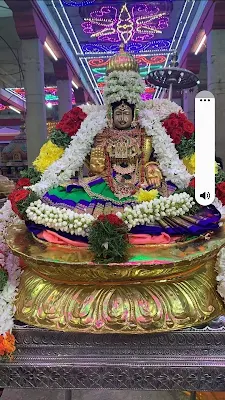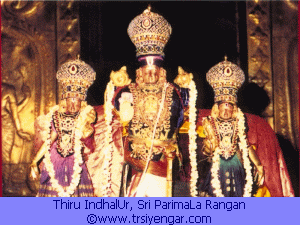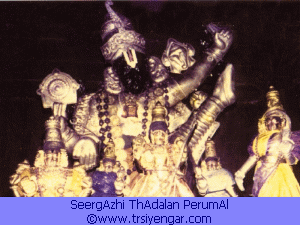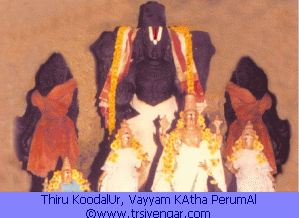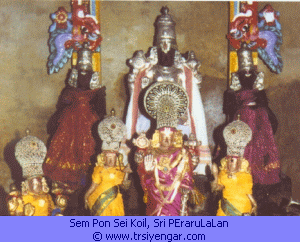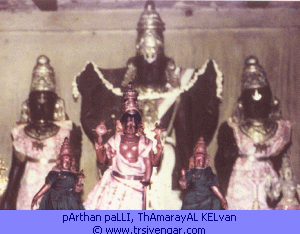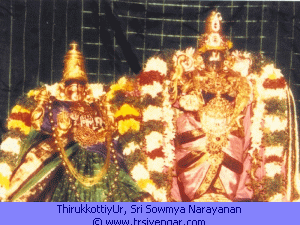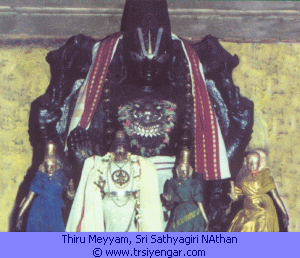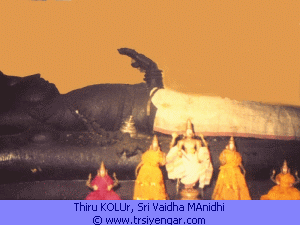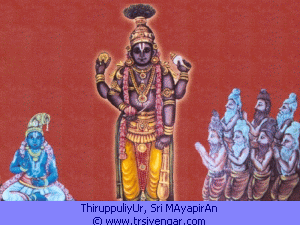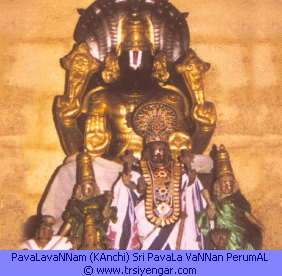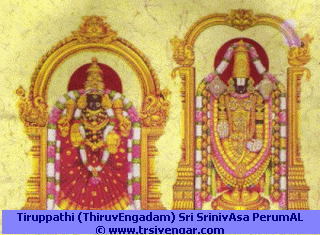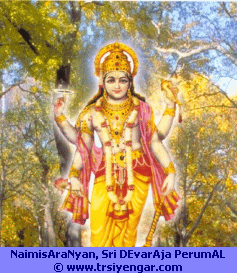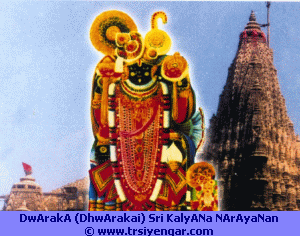giitagovindam
Chapter [sarga] 2 - aklesha keshavam
Blithesome Krishna
अक्लेशकेशवम्
Intolerant of Krishna’s flirtatious behaviour with other girls, Rādha deviates from ronde dance and complains all her feelings to her friend. Even in her complaining that Krishna is cheerfully irresponsible – blithesome Krishna, for his prema, love divine. aklesha keshava, she extols Krishna’s enrapturing nature.
विहरति वने राधा साधारणप्रणये हरौ
विगलित निजोत्कर्षादीर्ष्यावशेन गतान्यतः।
क्वचिदपि लताकुञ्जे गुञ्जन्मधुव्रतमण्डली
मुखरशिखरे लीना दीनाप्युवाच रहः सखीम्॥ २-१
पदच्छेद - विहरति वने राधा साधारण प्रणये हरौ विगलित निज उत्कर्षात् ईर्ष्या वशेन गत अन्यतः
क्वचित् अपि लता कुंजे गुंजत् मधु व्रत मण्डली मुखर शिखरे लीना दीना अपि उवाच रहः सखीम्
2-1. harè= by Krishna; saadhaaraNa= general [fairly, in a fair and square manner]; praNaye= in lovingness [Krishna, whose love is equipoise in respect of other milkmaids and herself]; vane viharati = in woodlands, while pleasure-tripping; vi galita= muchly [steeply,] slithered; nija= one's own [Rādha's]; utkarSaat= by her superiority complex, [privilege]; iirSyaa vashena= begrudge, by control of [overtaken by]; anyataH gata= elsewhere, gone; raadhaa= Rādha; kvachit api= somewhere, even; gu.njat madhuvrata= humming, honeybees, swarms of; maNDalii= spiralling; mukhara= with noise; shikhare= at spire [of bower]; lataa ku.nje= in tendrils, of bower; liinaa= steeped in; diinaa= forlornly [Rādha]; rahaH= in solitude; sakhiim = to girlfriend; api uvaacha= even, said.
Steeply slithered is Rādha's privilege, for Krishna's love is equipoise in respect of all other milkmaids and herself, thus some grudge overtook her when he is pleasure-tripping with others, hence she has gone elsewhere, somewhere into a bower of tendrils noisy with the humming of swarms of honeybees spiralling at its spire, and when she steeped into that bower she forlornly said this to her girlfriend, in solitude. [2-1]
She became a forlorn one as the humming noise of bees is increasing her passion for Krishna, bhramaraiH kaamoddiipita; hence, unable to endure it she has become somewhat a forlorn one, who otherwise is a resolute girl.
Again the word rahaH sakhiim uvaaca is sometimes said as ' she told her secrets...' etc. But whole world knows what her secret is, i.e., to have Krishna for herself... Hence, it is - said in solitude - what she is going to say is not to be heard by others... even if someone is going to eavesdrop she/he shall presume it as the humming of bees, as she is going to tell next aSTa padi in a tune and wording almost like the buzz of bees.
Then, diinaa api forlorn one, even so; even so she became a forlorn one by losing her pride, she got guts in regaining it - cf., Rāmayana, 4-6-23, tataH saH raaghavaH diinaH sugriivam idam abraviit... even if Rama became a forlorn one, he spoke to sugriiva self-confidently.
In this verse it is vipralambha sringaara, as Rādha is intolerant of Krishna's separation; rasavad alankaara - as she is ecstatic; shabda alankaara called varNa anupraasa; naayika -prauDha; metre - hariNi.
अ प - ५ - मधुरिपु रत्न कण्ठिक
संचलदधरसुधामधुरध्वनिमुखरितमोहनवंशम् ।
चलितदृगंचलचंचलमौलिकपोलविलोलवतंसम् ।
रासे हरिमिह विहितविलासम् स्मरति मनो मम कृतपरिहासम् । धृवम्॥ अ प ५-१
पदच्छेद - संचलत् अधर सुधा मधुर ध्वनि मुखरित मोहन वंशम् चलित दृगंचल चंचल मौलि
कपोल विलोल वतंसम् रासे हरिम् इह विहित विलासम् स्मरति मनो मम कृत परिहासम्
a pa 5-1. sa.ncarat or sa.nchalat= pulsating; adhara= from lips; sudhaa madhura= with ambrosial, sweetness, [lusciousness]; dhvani= by melody; mukharita= sounded, fluted; mohana= causing delight, or, mohana named; va.nsham= ba,mboo flute; chalita= flitting; dR^ik a.nchala = eye, ends - sidelong glances; cha.nchala= swaying, nodding; mauli= head, or half-crown, or peacock feathers; kapola = on cheeks; vilola= dangling, swaying; vata.nsam= knobby ear-hangings; [next stanza is a reprise in next foots]; iha= here; raase= in ronde dance; vihita vilaasam= having, frolics; kR^ita= made; parihaasam= fun of me, or, uncared-for, with blithe indifference towards me; [api cet = even, though]; mama manaH smarati= my, heart, reminds; harim= of Krishna [alone.]
Or
a pa 5-1. hè sakhii; raase vihita vilaasam= in ronde dance, one who is having, frolics – one who frolicking with others in ronde; kR^ita parihaasam= one who is making, fun of me, or, uncared-for, one with blithe indifference towards me – one who has utterly ignored me; [api cet = even, then]; harim= of such a Krishna [alone]; mama manaH iha smarati= my, heart, even now in bower, reminds me; sa.ncarat or sa.nchalat= pulsating; adhara= sudhaa madhura [dhvani] = from lips, with ambrosial, sweetness, [lusciousness of melody]; mukharita= sounded, fluted; mohana= causing delight, or, mohana named; va.nsham= bamboo flute; chalita= flitting; dR^ik a.nchala = eye, ends - sidelong glances; cha.nchala= swaying, nodding; mauli= half-crown, or peacock feathers – one who has got such a crown; kapola vilola vata.nsam= on cheeks, dangling, swaying, knobby ear-hangings – one who has such earhangings; such a harim; mama manaH smarati= my, heart, reminds me; iha= now, even after my leaving him and coming into this bower.
"Upon whose head a diadem of peacock feathers, nodding with every nod of his head to every bar of his tunes, is there; upon whose eyes sidelong glances, flitting from one maid to the other only to observe their observation of his fluting fugues, are there; upon whose cheeks his ear-knobs delightfully sway with every tenor of his fluting, him my heart recollects... but, here he is frolicking in ronde dance, blithely making fun of me... albeit, my heart reminds me of Krishna alone... [a pa 5-1]
This is the nakha-sikha paryanta varNana - depiction from toe to top. Here it is reversed to sikha-nakha paryanta varNana - top to toe, later adopted by poet bilvamangala in his shrii krishna karNa amritm.
चन्द्रकचारुमयूरशिखण्डकमण्डलवलयितकेशम् ।
प्रचुरपुरन्दरधनुरनुरञ्जितमेदुरमुदीसुवेशम्॥ अ प ५-२
पदच्छेद - चन्द्रक चारु मयूर शिखण्डक मण्डल वलयित केशम् प्रचुर पुरन्दर धनुः
अनुरंजित मेदुर मुदीर सुवेशम् । रासे हरिमिह...परिहासम्
a pa 5-2. chandraka= plumage of peacock; chaaru= beautiful; mayuura= of peacock; shikhaNDaka= tail, plumes with eyelike markings; maNDala= with a bunch of; valayita= enwreathed; kesham= [blackish] hairstyle; prachura= expansive; purandara dhanuH= Indra's, bow = rainbow; anura.njita= decorated with, with a wraparound; medura= thickly; mudiira= [like] cloud; su vesham= with beautiful, attire; reprise: raase harimiha ... parihaasam= as above.
"Upon whose blackish hairstyle a splendid wreath of peacock-plumery with moonlike markings is there; upon whose sapphirine body a spectacular ochry golden silk attire is there with which he takes after a cerulean cloud with a wraparound of a expansive rainbow... him my heart recollects... such as he is, he is frolicking here in ronde, blithely making fun of me... albeit, my heart reminds me of that Krishna alone... [a pa 5-2]
There are two concepts here. One, any seen peacock is reminding her of Krishna as he has peacock plumes in his crown. The other, every cloud is appearing like him, as blue-black, cerulean hue, is common to both, and common are the colourful rainbow on a cloud and rainbow-like attire on this boy. Hence she is in a fit of the blues.
गोपकदम्बनितम्बवतीमुखचुम्बनलम्भितलोभम् ।
बन्धुजीवमधुराधरपल्लवमुल्लसितस्मितशोभम्॥ अ प ५-३
पदच्छेद - गोप कदंब नितंब वती मुख चुंबन लंभित लोभम् बंधु जीव मधुर अधर
पल्लवम् उल्लसित स्मित शोभम् - रासे हरिमिह ... परिहासम्
a pa 5-3. gopa= milkmaids; kada.mba= group of [samuuha, brindam, nikurambam, kadambam - amara kosha; not Kadamba tree]; nita.mba vatii= with beamy buttocks, women having them [gagana jaghana]; mukha= face; chu.mbana= in kissing; la.mbhita= that which is acquired [his own interestedness]; lobham= interested in, curious; ba.ndhujiiva= bandhuuka flower, a rosy red flower; madhura= dainty; adhara= lower lip; pallavam= tender leaf like; ullasita= beaming; smita= smile; shobham= by which he is shining forth; reprise; raase harimiha ... parihaasam= as above.
"Upon whose face an air of curiousness, in making the hosts of beamy buttocked milkmaids to kiss, is there; upon whose face dainty and leaflet like lips that resembles the roseate bandhuuka flower are there; upon which lips a beaming smile is there, with which he ever shines forth, him my heart collect... but, he is frolicking here in ronde, blithely making fun of me... yet, my heart reminds me of Krishna alone... [a pa 5-3]
Please read the word mukha as face, but not as mouth, since mouth's function is different from that of lips, insofar as kissing is concerned. Whenever Rādha sees a Bandhuuka flower, a rosy red flower, Krishna's delicate lower lip is coming to her mind, but unavailable is his face, as other round-bottomed girls are invading it. Then why not Rādha follow the suite of other girls? How can she do so, when others are mobbing him? Moreover she wants him, only for herself, without any sharing or partaking. Then the friend may question her, asking 'why you are after that boy when he is after those many?' For that Rādha's answer is: 'He is fully interested in me... none else... la.mbhita lobham... but he acquired an interestedness, created by those girls, when all those girls forcibly dragged him away, so allowed them to kiss his face... hence, I extol him and his attributes, as he really belongs to me...'
Round-bottomed milkmaids... ni.ndaa vaacaka... Rādha is sneering at other girls for their ungainly physique, as Rādha herself is the most beautiful girl.
विपुलपुलकभुजपल्लववलयितवल्लवयुवतिसहस्रम् ।
करचरणोरसि मणिगणभूषणकिरणविभिन्नतमिस्रम्॥ ५-४
पदच्छेद - विपुल पुलक भुज पल्लव वलयित वल्लव युवति सहस्रम् कर चरण उरसि
मणि गण भूषण किरण विभिन्न तमिस्रम् - रासे हरिमिह...परिहासम्
a pa 5-4. vipula= immense; pulaka= with frisson; bhuja pallava= arms, tender leaf like; valayita= encircled [embraced]; vallava yuvati sahasram= cowmen, maids, thousands [and thousands of milkmaids]; kara charaNa urasi= on hands, feet, chest; maNi gaNa bhuuSaNa = jewels, sets of, jewelry; kiraNa= [by that jewelry's] shaft of light, [luminosity]; vibhinna tamisram= dispelled, darkness [gloom]; raase harimiha ... parihaasam= as above.
"Upon whose chest, hands and feet an assortment of jewellery is there that dispels luminosity, especially when hosts of milkmaids embrace him with their leaflet like frissony arms, just to dispel darkness around, him my heart recollects... but, here he is frolicking in ronde, blithely making fun of me... yet, my heart reminds me of such a Krishna alone... [a pa 5-4]
The word tamisram is not the darkness of night alone, but the general darkness, gloom, ignorance etc., as in tamasomaa jyotir gamayaH. A single ray of light from his jewellery is enough to dispel any kind of darkness, then what more can be said of his total jewellery and about himself. Thus the ignorance of all the other milkmaids is dispelled, call them as sages and saints of Ramayana times, as you may, as a kind of deliverance.
On Rādha's side, she is remembering their starting time episodes. When they started homeward the night was falling, and the pathway was darksome. Krishna played her along till she came very near to him. But when she neared him all the darkness around them is dispelled only because of the luminosity of his jewellery, and she was prudish to be with him in broad daylight like resplendence. She ran away into darkness. But he is already there with his luminosity and it was inescapable for her to avoid him, in many an attempt. In the meanwhile other milkmaids came and carried him away, and she is disgruntled, and now she is grunting about it.
जलदपटलवलदिन्दुविनन्दकचन्दनतिलकललाटम् ।
पीनपयोधरपरिसरमर्दननिर्दयहृदयकवाटम्॥ ५-५
पदच्छेद - जलद पटल वलत् इन्दु विनिन्दक चन्दन तिलक ललाटम् पीन पयोधर
परिसर मर्दन निर्दय हृदय कवाटम् - रासे हरिमिह ... परिहासम्
a pa 5-5. jalada paTala calat or valat indu = in clouds, crowds of, moving, moon; vi nindaka= verily, deploring - look down on; chandana tilaka= sandal paste [mark on forehead]; lalaaTam= one with such a forehead; piina= busty; payodhara= bosoms; [maNDala= area, bust] parisara= nearby, closely, tightly; mardana= on rubbing; nir daya= without, mercy - implacable; hR^idaya kavaaTam= -heart [chest,] door; raase harimiha ... parihaasam= as above.
"Upon whose forehead a roundish mark of sandal paste that always spurns roundel moon moving in the crowds of clouds is there; upon whose chest busty milkmaids tightly rub their bosoms, making it hardened and a strong-doored-chest encasing his implacable heart… him my heart recollects… but, he is frolicking here in ronde, blithely making fun of me... albeit, my heart reminds me of Krishna alone... [a pa 5-5]
The moon moving in clouds is reminding her about the round sandal-paste mark on Krishna's forehead. The moon may not be moving in clouds as in shaakhaa-candra nyaaya, but Krishna's head is definitely and constantly nodding while piping his flute. Then his face is like a mass of clouds, and sandal mark on forehead is brilliant than the semi-visible moon in clouds. Though he is boy his chest is so hardened to keep his all-loving heart in a strong-doored strongroom. From his childhood his chest is rubbed against busty bosomy breasts, either of women of vraj, or of demoness puutana from madhura. Hence this boy is calculatingly entertaining unassuming milkmaids, but heedless of Rādha, as her claim is for ownership of the very same boy, and hence Rādha is with this discontentment, yet not able to forget him.
मणिमयमकरमनोहरकुण्डलमण्डितगण्डमुदारम् ।
पीतवसनमनुगतमुनिमनुजसुरासुरवरपरिवारम्॥ ५-६
पदच्छेद - मणि मय मकर मनोहर कुण्डल मण्डित गण्डम् उदारम्
पीत वसनम् अनुगत मुनि मनुज सुर असुर वर परिवारम् - रासे हरिमिह ... परिहासम्
a pa 5-6. maNi maya= gems, full with; makara= crocodile; manohara= heart-stealing; kuNDala= knobby ear-hangings; maNDita= decorated, [illuminates as in 3 decorate (an initial letter, a manuscript, etc.) with gold, silver, or brilliant colours etc.]; gaNDam= one with such jawlines; udaaram = a glorious one; piita vasanam= ochry silks, clad in; anu gata= in tow, followed by; muni= sage; manuja= human; sura= gods; asura= demon; vara parivaaram= best, followers, fraternity; raase harimiha ... parihaasam= as above.
"Upon whose jawlines crocodile-like ear-hangings will be swaying, illuminating his sapphirine cheeks with every libration of his flute; upon whose sapphirine body golden ochry silks with brilliant colour are there as puNya vastra, vestire sancta; my heart recollects such a glorious one with a best fraternity of gods, demons, and men following him… but, he is frolicking here in ronde, blithely making fun of me... yet, my heart reminds me of Krishna alone... [a pa 5-6]
Here his followers are said in singular, but we usually take it as plural for generalisation. In singularity they are: among gods it is Sage naarada; among demons it is Emperor Bali; among humans it is Bhiishma pitaamah, where all the three symbolise 'surrendering, forfeiture, dedication...' naarada is an out-and-out dedicatee of Vishnu and his incarnations, Emperor Bali is a non-naysayer, and Bhiishma is renowned for his forfeiture of a vast kingdom for the sake of one solemn promise. Of course, Rādha as an illiterate 'thumb-impression' girl may not know all these things, but the poet knows, and hence he puts these expressions on her tongue, since she too is no less a devotee. She as a poor girl from a hamlet may not have kingdoms to forgo like Bhiishma, forgo spheres of worlds like Bali, and utmost scriptural knowledge like Narada, But she is female and female's body and soulalone are her property or possessions, which she wants to surrender unto Supreme Being.
विशदकदम्बतले मिलितम् कलिकलुषभयम् शमयन्तम् ।
मामपि किमपि तरन्गदनङ्गदृशा मनसा रमयन्तम्॥ ५७
पदच्छेद - विशद कदंब तले मिलितम् कलि कलुष भयम् शमयंतम् माम् अपि किम् अपि तरंगत्
अनंग दृशा मनसा रमयंतम् - रासे हरिमिह ... परिहासम्
a pa 5-7. vishada= serene; kada.mba tale= at kadamba tree, base; militam=mingled, arrived at; kali= praNaya kalaha = niggling in romance/ Kali, the fourth era; kaluSa= manaH kaaluSya= blemish; bhayam = fear; shamaya.ntam= mollifier; kim api tara.ngat = a little, roving; ana.nga dR^ishaa manasaa = with Love-god's, look [with passionate looks], with such intentions; maam api= me, even; ramaya.ntam = he who has exhilarated; raase harimiha ... parihaasam= as above.
"Upon whose face there are roving eyes that intentionally flit with passionate looks; upon him my heart recollects for he is a mollifier of niggles in romance who earlier used to come to the base of a certain serene kadamba tree just to exhilarate me... but, now he is frolicking here in ronde, blithely making fun of me... albeit, my heart reminds me of Krishna alone... [a pa 5-7]
kadamba tale militam: He who is mixed up or mingled in the darkness at a peaceful kadamaba tree, pre-set by me, only to hoodwink me; kali kaluSa... one as above, and the other is the mollifier of the blemishes of Kali era, the fourth era; drishaa, manasaa ca - not only by his gracious looks but with his kind heart also; maam api - even me, as I deserve supreme love and affection of the Supreme, as none other can exhilarate me; lokottara prema arhiNii - raadhika, hence I reminisce about him...
श्रीजयदेवभणितमतिसुन्दरमोहनमधुरिपुरूपम् ।
हरिचरणस्मरणम् प्रति संप्रति पुण्यवतामनुरूपम्॥ ५-८
पदच्छेद - श्री जयदेव भणितम् अति सुन्दर मोहन मधु रिपु रूपम्
हरि चरण स्मरणम् प्रति संप्रति पुण्यवताम् अनुरूपम् - रासे हरिमिह ... परिहासम्
a pa 5-8. shrii= shrii suukti= sacred saying; jayadeva bhaNitam= by jayadeva, said; ati sundara= most, beautiful; mohana= enrapturing [physically rapturous to milkmaids, divinely to whole of the world]; madhu ripu= Madhu, the demon's, enemy's Krishna; ruupam = form; puNyavataam= pietistic people; hari charaNa= at Krishna's, feet, or, Krishna’s, comportment – in conducting raasa liila etc; smaraNam prati= towards cogitation; samprati= presently [in this kali yuga]; anuruupam = befitting saying/poem; raase harimiha ... parihaasam= as above.
"Upon whose beautiful and all-enrapturing form a sacred saying is said by Jayadeva, a befitting saying for pietistic people to cogitate over the feet of Krishna in this Kali era, him my heart recollects… but, he is frolicking here in ronde, blithely making fun of me... albeit, my heart reminds me of Krishna alone... [a pa 5-8]
The last line of reprise is generally removed in this verse, as it will be confusing whether Rādha is saying this, or it is the poet's saying. But if read with next verse, it is Rādha's dialogue that is continued.
Verse Locator
गणयति गुणग्रामम् भामम् भ्रमादपि नेहते ।
वहति च परितोषम् दोषम् विमुञ्चति दूरतः ।
युवतिषु वलस्तृष्णे कृष्णे विहारिणि माम् विना
४पुनरपि मनो वामम् कामम् करोति करोमि किम्॥ २२
पदच्छेद - गणयति गुण ग्रामम् भामम् भ्रमात् अपि नेहते वहति च परितोषम् दोषम् विमुंचति
दूरतः युवतिषु वलत् तृष्णे कृष्णे विहारिणि माम् विना पुनः अपि मनः वामम् कामम् करोति करोमि किम्
2. hè sakhii= oh friend; mama manaH vaamam= my, heart, is divergent; maam vinaa= me, without [leaving me out]; vihaariNii= frolicking; yuvatiSu= among damsels; valat tR^iSNe kR^iSNe = one over, ambitiously [involved] in such a Krishna; [mama manaH= my, heart] punaH api= again, even [repeatedly]; kaamam= abhilASa= desire; karoti= doing [inciting]; guNa graamam gaNayati= [his] traits, group of [lot of,] reckoning; [mama manaH= my, heart] bhramaat api= by mistake, even; bhaamam nehate= resentment, thinks not; doshham duurataH vimu.nchati= error, distantly, discarding; [mama manaH= my, heart] paritoSam vahati ca= gladness, bearing up, also; kim karomi= what, I should do.
"My heart is diverging from my control, oh, friend, inciting repeated desire in me for that Krishna alone, though he is overambitiously frolicking with other damsels leaving me in lurch; discarding his errors distantly my heart is reckoning a lot of his noble traits alone… it does not think of resenting him even by mistake; more so, my heart bears up gladness on thinking about him... what am I to do... [2-2]
vaamam - mutually contradictory states of mind; gladdening in an unbefitting time; though he is erroneous, thinking that he does not err; though he has no inclination in her, presuming that he is absolutely predisposed towards her - all these are vaamam- leftish states.
The mood of heroine is known as utkaNThita - heroine in ecstasy. In verse of bharata muni uddaapanamanmatha mahaa jvara vepamaanaam romaa.ncaka kaNTakitam a.nga ka.mpam a.ngakam aavaha.ntiim | sa.mveda vepadhu ghanotkalika akula a.ngiim utkaNThitaam vadati taam bharataH || She who is in high fervidity of lovesickness, limbs in frisson, anguished, quivering, highly ecstatic, her bharata muni calls tkaNThita naayika. Though these songs of Jayadeva peripherally appear as just wordplay and singable songs, they are replete with moods, gestures, and postures etc of dance forms, as contained in naaTya shaastra, the treatise of dance of bharata. Let's load them later.
There is no reason or motive as to why she should love Krishna; hence alankaara is vibhaavana alankaara; though he is frolicking with other girls she is all praise for him, hence viSeSokti alankaara; in other places there is yamaka alankara; hariNi - is its metre.
In next song every expression is from the viewpoint of Rādha in a sort of self-eulogy. For e.g. statements like madana manoratha bhaavitayaa will mean - 'she who is having a desire'; mR^idu madhura smita bhaaSitayaa- 'she who talks dear and softly'; kR^ita pari rambhaNa chumbanayaa 'she who had kisses after a bracing embrace' etc. In summary, these roundabout sayings mean: 'because she, who had such and such experience, or faculty, is eligible even now to get his love. So, make him to take delight in me...' Here these 3rd per. are reduced to 1st per. sing, as far as possible
Verse Locator
अष्ट पदि ६ अक्लेश केशव मङ्जरी तिलकम्
निभृतनिकुञ्जगृहम् गतयानिशिरहसिनिलीयवसन्तम् ।
चकितविलोकितसकलदिशा रतिरभसभरेणहसन्तम् ।
सखि हे केशिमथनमुदारम् ।
रमय मया सह मदनमनोरथभावितया सविकारम् धृवम्॥ ६१
पदच्छेद - निभृत निकुञ्ज गृहम् गतया निशि रहसि निलीय वसन्तम्
चकित विलोकित सकल दिशा रति रभसभरेण हसन्तम् सखि हे केशि मथनम्
उदारम् रमय मया सह मदन मनोरथ भावितया सविकारम्
a pa 6-1. he sakhi= oh, friend; udaaram= [let that] beautiful one, or a bountiful one – Krishna; keshi mathanam= demon keshi, the subjugator of – Krishna subjugated that demon by beguiling, hence keshi mathana came mean – a habitual beguiler; madana manoratha bhaavitayaa = for love, heart seeking, one who with such thinking – I who am longing for love of that Krishna, as my heart is filled with love for him; mayaa saha= me, along with [in me]; sa vikaaram= with all, his actions – when applied to applicable to Krishna, nakha kShata aadi naanaa sRingaara vikaaraiH; or, when applied to Rādha - while I show all vikaaraaH - stana naabhii muula prakaTanam ityaadi cheSTaaH during our union; ramaya= so, you make him to take delight [in me].
Because, once he met me in this way:
nibhR^ita= lonely, silent; niku~nja= bower, gR^iham= in such a cabin - alcove; gatayaa= one who has gone [Rādha -when I have gone into an alcove]; mayaa saha= me, along with - he who is besides me; nishi= in night; rahasi= secretly; niliiya= merged, hiding; vasantam= on who is already staying there; chakita= startled [when I was startled]; vilokita sakala dishaa = [I who was] seeing around, in all, directions; mayaa saha= me, along with; rati= intimacy; rabhasa= hastiness; bhareNa - or - raseNa= he who is filled with, who is agog; hasantam= one who is smiling; keshi mathanam= demon keshi, the subjugator of – such a Krishna; madana manoratha bhaavitayaa = for love, heart seeking, one who with such thinking – I who am desirous, as my heart is filled with love for him; my mind and heart are eager for his love]; mayaa saha= me, along with [in me]; ramaya= you make him to take delight [in me].
"One night when I have gone into a prearranged lonely alcove I was startled for his truancy and started to see all around for him... but that bounteous pleasure-giver was already there, coming earlier and hiding in the darkness... then he suddenly appeared from nowhere startling me again, but smiling wryly with all his lustful comportment… then he, filled with hastiness for an exigent intimacy, met me... oh, friend, why don't you make him to take a similar delight in me even now, when my heart and mind are filled with lustful longing for him... [a pa 6-1]
keshi madhanam - Krishna beguiles the demon keshi in order to eliminate him. A beguiler must be capable enough to get his things done, so Krishna's vancakatva, saamarathya are suggested here. He beguiles everyone who goes on a wrong track, only to bring him to the right path. In this verse he is said to be hasantam - laughing at her for not finding him who is already at her side, suggests that he beguiles anyone, if he/she seeks him for their ulterior motives.
प्रथमसमागमलज्जितया पटुचाटुशतैरनुकूलम् ।
मृदुमधुरस्मितभाषितया शिथिलीकृतजघनदुकूलम् ।
सखि ... सविकारम्॥ अ प ६-२
पदच्छेद - प्रथम समागम लज्जितया पटु चाटु शतैः अनुकूलम् मृदु मधुर
स्मित भाषितया शिथिली कृत जधन दुकूलम् सखि ... सविकारम्
a pa 6-2. prathama samaagama lajjitayaa = during first, meeting [I who was] bashful; paTu chaaTu shataiH = capable [with reassuring words], good words, hundreds of; anukuulam= agreeable [he made me agreeable to him]; mR^idu madhura smita= softly, sweetly, smiling; bhaaSitayaa= one who is speaking [Rādha, myself]; shithilii kR^ita= collapse, made to [stripped down]; jaghana= hip; dukuulam= silk dress; sakhi - savikaaram= reprise, as above.
"I was very bashful on my first tryst… but saying hundreds of reassuring good words he brought me round… then, I was speaking softly, sweetly and smilingly, unaware when my silken dress slipped from my hips... then he, filled with hastiness for an eager intimacy, met me... even now, oh, friend, why don't you make him to take suchlike delight in suchlike me, when my heart and mind are filled with lustful longing for him... [a pa 6-2]
prathama samaagama lajjita - damsels are bashful, silent, and uncertain in fist tryst, na uktaH kasmaat it nava vadhuu ceSTitam cintayantii pascaattapam vahati taruNii premNi jaate rasaj~nayaa... bharata muni
paTu caaru shataiH anukuulam - hero has some techniques of speaking good and soft words in first meeting - prathamam iha deyam puuga puSpaadikam syaat mridu madhu vacobhiH vojayet tat sannidhaanam...
shithilii kR^ita - antarbhaavita Nic` - the silk dress collapsed on its own, neither Rādha nor Krishna are responsible for it - kaante talpam paagate shithilitaa niivii svayam bandhanaat... bharata muni
jaghana dukuulam - it is already a slippery silk sari, just tied with a simple knot while a golden girdle string - mekhala - is helping it to remain on her hips. But when the heroine has seen Super hero - naakaya uttama - her ecstasy made that knot to loosen and girdle string to unfasten - niivii ca skhalati sthitaa api su dhR^iDham kaamengite yoSitaam...
किसलयशयननिवेशितया चिरमुरसि ममैव शयानम् ।
कृतपरिरम्भणचुम्बनया परिरभ्य कृताधरपानम् ।
सखि ... सविकारम्॥ अ प ६-३
पदच्छेद - किसलय शयन निवेशितया चिरम् उरसि मम एव शयानम्
कृत परिरम्भण चुम्बनया परिरभ्य कृत अधरपानम् सखि ... सविकारम्
a pa 6-3. kisalaya= tender grass, lawn; shayana= as bed; niveshitayaa= placed in [on reposing me]; chiram= all the time; mama urasi eva= on my, chest, only; shayaanam= he who reposed on it; kR^ita= on making; pari rambhaNa= bracing, embraces; chumbanayaa= with kisses; pari rabhya= in besetting manner, hugging [graspingly]; kR^ita adhara paanam= done, lower lip, swilled; sakhi … savikaaram= as above.
"Reposing me on a bed-like lawn he reposed on my chest all along... making bracing embraces he kissed and swilled my lips graspingly... then he, filled with hastiness for an intimacy, met me... even now, oh, friend, why don't you make such excited Krishna to take a similar delight in suchlike me, when my heart and mind are filled with lustful longing for him... [a pa 6-3]
The first embracing is called kShirra - niira aalingana - milk-water embrace, also called tila-tanDula - gingelly seeds and rice embrace. And kRita parirambha cumbanayaa - is called jaghanopa shleSa - karajadana kR^ityam cumbanam vaa vidhastsuH | kathayati jaghanopa shleSam enam muniindraH || Then the kissing is called samauSTa - cumbostavam nR^ityati yatra naarii proktam samauSTam kavibhiH puraaNaiH ||. And then the type of kissing said in - parirabhya kR^itaa adhara paaanam - is called lalaaTika - sa aananda bhaavam shrama miilita akSham lalaatikam tatva vido vadanti ||
अलसनिमीलितलोचनया पुलकावलिललितकपोलम् ।
श्रमजलसकलकलेवरया वरमदनमदादतिलोलम् ।
सखि ...सविकारम्॥ अ प ६४
पदच्छेद - अलस निमीलित लोचनया पुलक आवलि ललित कपोलम् श्रम जल
सकल कलेवरया वर मदन मदात् अति लोलम् - सखि ... सविकारम्
a pa 6-4. alasa= tired; thereby;nimiilita= slouching; lochanayaa= with eyes [rather, eyelids, and such as I was]; pulaka= tingles; aavali= a series of; lalita= delicate; kapolam= cheeks [of Krishna, or of Rādha]; shrama jala= strain, water [sweat]; sakala kalevarayaa= whose whole, body is, [such as I was]; vara madana madaat= utmost, love-god [passion,] by intemperance; ati lolam= wholly, swinging - that Krishna - let him take delight in suchlike me; sakhi - savikaaram= as above.
"I was tired then, hence my eyelids were slouching; his delicate cheeks too experienced a series of tingles; then whole of my body was wet with sweat, while his body too was highly vibrating with passionate intemperance; such as we were, we first met... while he, filled with hastiness for an exigent intimacy, met me..., oh, friend, why don't you make such a passionate Krishna to take similar delight in suchlike me even now, when my heart and mind are filled with lustful longing for him... [a pa 6-4]
By the slouching eyelids, the type of kissing is called - anaghR^iSTa cumbana -...yatra lolaa aakhyaatam rasaj~naiH anghR^iSTa sanj~nam || And by embracing his love, Krishna is said to have lovely tingling on his cheeks and it is called saattvika vikaara -which is of eight kinds as bharata muni says: svedaH kampaH atha romaancaH svara bhangaH atha vepadhuH | vaivarNyam ashru pralayau iti aSTau saattvikaaH smR^itaaH || - sweating, thrilling, shivering, voice fading, wobbling, colour fading, tears of happiness, or tearless state these eight are temperate moods...
कोकिलकलरवकूजितया जितमनसिजतंत्रविचारम् ।
श्लथकुसुमाकुलकुन्तलया नखलिखितघनस्तनभारम् ।
सखि ... सविकारम्॥ ६-५
पदच्छेद - कोकिल कल रव कूजितया जित मनसिज तंत्र विचारम् श्लथ कुसुम
आकुल कुन्तलया नख लिखित घन स्तन भारम् - सखि ... सविकारम्
a pa 6-5. kokila= kokila, black singing bird; kala rava= inexplicable, cooing; kuujitayaa= one who cooing like that [myself]; or, kokila= like koel; kalaraa= like a pigeon; kuujitayaa= calling / cooing –I who has such faculty; jita = one who conquered, mastered; manasi ja = mind, born one [Love-god]; ta.ntra= treatise [of Love, kaama shaastra]; vichaaram = one who can ponder over such lovemaking treatises [Krishna]; shlatha kusuma= slithered, flowers –flowers slipped from my braid; aakula kuntalayaa= tousled, braid [my hair tousled]; nakha= by nails; likhita= written, scratched; ghana= busty; stana= bosoms; bhaaram= I who had to bear the weight [of such bosoms and that of Krishna on such bosoms]; sakhi - savikaaram= as above.
“I was cooing and calling like a koel or a pigeon when that prodigy in every treatise of lovemaking was further examining the possibilities of taking further delight in me, while flowers from my braid slithered, hair tousled, and I was slumping under my nail-scratched buxomy bosoms upon which he is reposing… all this in the good old days… even now, why don't you make him to take delight in such a beddable ladylove like me, when my heart and mind are filled with lustful longing for him... [a pa 6-5]
The type of scratching with nails is called panjakaja patra - according to sringaara shaastra. Actually 'beddable' is considered seductive or sexually attractive - adj. colloq. Here, she served like a bed to her inamorato.
चरणरणितमनिनूपुरया परिपूरितसुरतवितानम् ।
मुखरविशृङ्खलमेखलया सकचग्रहचुंबनदानम् ।
- सखि ... सविकारम्॥ अ प ६-६
पदच्छेद - चरण रणित मनि नूपुरया परिपूरित सुरत वितानम् मुखर
विशृंखल मेखलया सकच ग्रह चुंबन दानम् - सखि ... सविकारम्
a pa 6-6. charaNa raNita= by feet, made to jingle; mani nuupurayaa= gemmy, anklets; paripuurita surata vitaanam= fulfilled, copulation, with a group of [bandha bheda sahita ratim]; mukhara= while [anklets are] jingling; [next] vi+shR^i.nkhala= unfettered, fallen down; mekhalayaa = girdle-chain-set; sa kacha graha= by, hair bun, on grasping; chu.mbana daanam= kiss, one who gave as a gift; sakhi - savikaaram= as above.
"My gemmy anklets that usually jingle with every footstep of mine are made more jingly when he copulated with me in different conjoining postures; and when my girdle-chain-set has fallen down in that act, then he grasped my hair-bun to give a dole of kiss... such as we were we met to the content of our hearts... why don't you make him to take delight in suchlike me, even now, when my heart and mind are filled with lustful longing for him... [a pa 6-6]
The expression surata vitaanam - is many kinds of unions, namely indraaNi bandha etc., explained by vaastyaana kaama suutra-s, possible only for yogis or experts in sringaara shaastra. The girdle-chain-set is not an exaggerated expression, where that girdle ornament contains festoons of golden strings, ranging from a set of three to hundreds. Please see Seetha's Marriage, siitaa kalyaan in Ramayana, where each type is detailed. And making this sort of girdle-chain to fall without unfastening is called prenkhollikita vipariita rati - where vipariita rati - is not a crude type, but again a climatic and masterly act.
Caveat: All this stuff, like masterly acts, climatic union etc., will be good for reading and listening. Better limit them up to that stage. Trying to implement these things, on purchasing cheap books sold on railway platforms, or deducing from such half-baked translations like these, would be harmful, and we are told that a threat of death looms on one's head, if these yogic practices are practiced, without proper knowledge. Just construe that Krishna is a supramundane bhogi and yogi, and salute him. One cannot be a yogi unless he is a bhogi. That's all.
रतिसुखसमयरसालसया दरमुकुलितनयनसरोजम् ।
निःसहनिपतिततनुलतया मधुसूदनमुदितमनोजम् ।
सखि ... सविकारम्॥ ६-७
पदच्छेद - रति सुख समय रसा अलसया दर मुकुलित नयन सरोजम् निःसह
निपतित तनु लतया मधु सूदनम् उदित मनोजम् - सखि ... सविकारम्
a pa 6-7. rati sukha samaya= union, joy, at time of; rasaa alasayaa= by delight, relaxing; dara= a little; mukulita= closed; nayana= eyes; sarojam= lotuses; niHsaha= weakened; ni patita= down, fallen, reposing on lawn; tanu= body; latayaa= creeper plant like [myself, and with me]; udita= arisen; manojam= mind born, Love-god, passion; madhu suudanam= Madhu, the demon, subjugator, Krishna; sakhi - savikaaram= as above.
"When I with my creeper-plant-like body was reposing on lawn, relaxing delightedly with union-time-joyousness, he too reposed on lawn as he was weakened and his lotusy eyes were half-shut… but, he again sprang up as passion for me sprang up in him again… such as he was, why don't you make him to take delight in me even now, when my heart and mind are filled with lusting love for him... [a pa 6-7]
Here the heroine is utkanThita - ecstatic one, lustfully waiting for the arrival of hero. na eva aagataH samuciteSu api vaasareSu; viraha jvara taaita angiim utkanThitaam vadati taam bharata kaviindra... bharata muni.
श्रीजयदेवभणितमिदमतिशयमधुरिपुनिधुवनशीलम् ।
सुखमुत्कण्ठितगोपवधूकथितम् वितनोतु सलीलम् ।
सखि ... सविकारम्॥ अ प ६-८
पदच्छेद - श्री जयदेव भणितम् इदम् अतिशय मधु रिपु निधुवन शीलम्
सुखम् उत्कण्ठित गोप वधू कथितम् वितनोतु स लीलम् - सखि ... सविकारम्
a pa 6-8. shrii= shrii suukti, good saying, or, one who reveres the feet of Goddess LakShmi; jayadeva = [such a] Jayadeva; bhaNitam idam= said, this one; atishaya= by far; madhu ripu= Madhu's, enemy - Krishna's; nidhuvana shiilam= romances, having accounts of; sa liilam= having, romantic frolics [of Krishna]; utkaNThita= one who is ecstacised - Rādha, gopa vadhuu= milkers’, damsels – milkmaid Rādha; kathitam= told by her, or told thru her; [vaH= for all of us]; sukham vi tanotu= blessedness, amply, pass around; sakhi ... savikaaram= as above.
"Let this song that contains the accounts of Krishna's romantic frolics, as narrated by me, an ecstasied milkmaid called Rādha, and as penned by a worshipper of Goddess LakShmi called poet Jayadeva, broadly pass blessedness all round, for all of us… such as I am a well-wisher of one and all, I am wishing now to get Krishna to my side… oh, friend, why don't you make him to take delight in me even now, when my heart and mind are filled with love-longing for him... [a pa 6-8]
Some sentences are ellipted in the above song for summing up for the subtext. This song will not heard, in general, as it is loaded with some 'nakedness' in expression, and peripherally it sounds 'bad' and no singer can go on singing for the sake the praise of alankaara or sringaara shaastra contained in it. Hence it is ill fated to be sung. If at all it is sung, it is singable in guNa kriya raaga, eka taala, again both are unknown tunes and rhythms in these days, and none sings them in the tunes suggested by the poet-singer-dancer Jayadeva these days.
हस्तस्रस्तविलासवंशमनृजुभ्रूवल्लीमद्वल्लवी ।
वृन्दोत्सारिदृगन्तवीक्क्षितमतिस्वेदार्द्रगण्दस्थलम् ।
मामुद्वीक्ष्य विलज्जितम् स्मितसुधामुग्धाननम् कानने ।
गोविन्दम् व्रजसुन्दरीगणवृतम् पश्यामि हृष्यामि च॥ २-३
पदच्छेद - हस्त स्रस्त विलास वंशम् अनृजु भ्रू वल्लीमत् वल्लवी बृन्द उत्सारि
दृक् अन्त वीक्क्षितम् अति स्वेद आर्द्र गण्ड स्थलम् माम् उद्वीक्ष्य विलज्जितम् स्मित
सुधा मुग्ध आननम् कानने गोविन्दम् व्रज सुन्दरी गण वृतम् पश्यामि हृष्यामि च
2-3. he sakhii= of, friend; maam ut viikShya= me, up, seeing [seeing me by raising his neck, make sheep's eyes at with goggling eyes, this repeats with every action of Krishna]; hasta srasta= from hand, slid; vilaasa va.nsham= playful, mohana vamshi, the Flute; an + R^iju= not, straight, awry; bhruu= eyebrows; valliimat= wiry; vallavii bR^inda= milk maids', throng of; ut saari= up, flowing - raising head to catch a glimpse of Rādha over the heads of milkmaid gang; dR^ik a.nta= eye, up to end - sidelong glances; viikShitam= one who is casting out; ati sveda aardra= one with - much, sweat, moist; gaNDa sthalam=on cheek, places; maam ud viikShya= me, on goggling; vi lajjitam= verily abashed; smita sudhaa mugdha aananam = he who has smile, called nectar, on his pretty, face; kaanane= in woodlands, of Brindavan; govindam= at Krishna; vraja sundarii gaNa vR^itam= by Vraj, belles', mob, surrounded by; pashyaami hR^iSyaami ca= I have seen, I am delighted, also.
"Oh, friend, when he was frolicking as he like with the flocks of milkmaids, I suddenly entered the ronde… then, on goggling me his playful flute mohana vamshi slid from his hands, his wiry awry eyebrows raised, and he started to cast sidelong glances at me, as he is abashed to be among the throngs of milkmaids… then, his cheeks became moist with sweat to see me suddenly… thus, I saw him, whose face is pretty and whose smile is nectarean, in woodlands of Brindavan… but to see him surrounded by mobs of belles of Braj, I must be delighted - Really? [2-3]
Words of Rādha like 'I am delighted, or, I am happy etc', are not in appreciation, but they are her snappish words with jealousy and derision.
In another way: bR^inda= groups of belles; utsaari= to ward off, in dispelling; dRiganta viikShitam= with sidelong looks, he who is seeing; meaning that, "when I suddenly gone into ronde, he started to cast sidelong glances at other milkmaids to go away, as he was abashed to be in their company, while I was present... and such as he was, now why doesn't he come now, when I long for him?" - This is according to her ownership's viewpoint, as he solely belongs to her.
vipralambha - sringaara; diipaka - alankaara; naayaka -dakShiNa; lalaaTaanupraasa; paancaalii riiti; shaarduula vikriiDitam is its metre.
दुरालोकस्तोकस्तबकनवकाशोकलतिका ।
विकासः कासारोपवनपवनोऽपि व्यथयति ।
अपि भ्राम्यद्भृङ्गीरणितरमणीया न मुकुल ।
प्रसूतिश्चूतानाम् सखि शिखरिणीयम् सुखयति॥ २-४
पदच्छेद - दुर् आलोक स्तोक स्तबक नवक अशोक लतिका
विकासः कासार उपवन पवनः अपि व्यथयति अपि च भ्राम्यत् भृङ्गी रणित रमणीया
न मुकुल प्रसूतिः अपि चूतानाम् सखि शिखरिणी इयम् सुखयति
2-4. sakhi= oh, friend; dur aaloka= impossible, to see round; stoka= small; stabaka= bunches; navaka= new ones; ashoka= of ashoka trees; latikaa= creeper, twigs; vikaasaH= blooming; kaasaara = having lakes; upavana= fringe lands; pavanH= gentle wind; api ca= even, also; vyathayati= distressing; api ca= and, also; bhraamyat= whirling; bhR^iN^gii= female honeybees; raNita= sounded by them, their buzzing; ramaNiiyaa= beautiful; shikhariNii= having apexes; iyam chuutaanaam= this, of mango trees; mukula prasuutiH= folded, offspring - unblown buds; api = even that; na sukhayati= not, comforting.
"Oh, friend, for a lonesome girl it is impossible to see around this environ... this gentle wind that glides upon the lakes and their fringe lands making new twigs of ashoka trees to bloom is distressing... even the beautiful apexes of mango trees that have unblown buds, on which female honeybees are whirling and whirring, they too, are uncomfortable for me to see... [2-4]
kaasaara upavana in this the wind is gliding upon the lakes, hence it is cool, and when it is blowing gently on fringe lands, it is getting fragrance, and when it is circling around tress, twigs, and flowers, it is further cooled and collecting those flowers fragrances. But it is wholly torrid for her. Why wind alone, whole environs is dullish, gloomy and feverish. In mukula prasuuti the vernal mango trees are distressing even when their buds are in the process of parturition, and who knows what they will do when they are fully flowered.
alankaara - samuccaya, lalaaTaanu praasa; vipralambha sringaara; riiti - maagadhi; vritti/chandas - shikhariNi; and the beauty of composition is in including the name of the metre of poem, namely shikhiriNi, in the song itself. Some have understood this shikhiriNi as mountain.
साकूतस्मितमाकुलाकुलगलद्धम्मिल्लमुल्लासित ।
भ्रूवल्लीकमलीकदर्शितभुजामूलोर्ध्वहस्तस्तनम् ।
गोपीनाम् निभृतम् निरीक्ष्य गमिताकाङ्क्षश्चिरम् चिन्तयन् ।
अन्तर्मुग्धमनोहरम् हरतु वः क्लेशम् नवः केशवः॥ २-५
पदच्छेद - साकूत स्मितम् आकुला आकुल गलत् धम्मिल्लम् उल्लासित
भ्रू वल्लीकम् अलीक दर्शित भुजा मूल ऊर्ध्व हस्त स्तनम्
गोपीनाम् निभृतम् निरीक्ष्य गमित आकाङ्क्षः चिरम् चिन्तयन्
अन्तः मुग्ध मनोहरम् हरतु वः क्लेशम् नवः केशवः
2-5. hè bhagavad jano= oh, god-loving people; saakuuta= with inner meaning; smitam= having smiles; aakulaa aakula= thrills and throbs; galat= slipping; dhammillam= hair bun; ullaasita= up raised; bhruu valliikam= eyebrow, wiry ones; aliika= artfully; darshita= showing; bhujaa muula= shoulder, corners - armpits; uurdhva hasta= lifting up, arms; stanam= bosoms; gopiinaam= of milkmaids mugdha manoharam [yathaa tathaa]= simple-minded, heart-stealers [milkmaids]; [ceSTitam= acts of those milkmaids]; nibhR^itam= secretly; niriikShya= on seeing; antaH= innerly [in his heart]; gamita= relieved, got rid of; aakaa~NkShaH= longings; ciram = for a long time; cintayan= thinking; navaH= ever new; keshavaH= Krishna; vaH= our; klesham= despairs; haratu= steal away.
"Oh, god-loving people, he whose smiles imply something is seeing milkmaids who are with thrilling and throbbing, by which their hair buns are loosened and braids slipping repeatedly; they are raising up their arms as though to tie up their plaits, in doing so they are artfully showing are their armpits and bosoms repeatedly, in doing so, their see-sawing curvaceous eyebrows also confirm their desire for him, and he on seeing these wilful acts of simple-minded beauties of Brindavan, he got rid of his longings, for he satisfied them to their content, and stayed there thinking for along time, such as he is, he that ever-new Krishna shall deprive us of all of our despairs... [2-5]
This verse will not be found in other recensions, but available in south. nava Krishna - ever-new Krishna, kShaNe kShaNe yat navataam upaiti tat eva ruupam ramaNiiyataayaaH whoever/whatever gets newness minute by minute that is the name of beauty. Here Krishna himself is that newness, and he is becoming, new, newer etc., only by these simple-minded acts of milkmaids. subhaaSitena giitena yuvatiinaam ca liilayaa | ceto na bhidyate yasya sa vai mukto athavaa pashuH || 'he who remains unperturbed by good sayings, or by music, or by the lovely acts of womenfolk, he must be a saint or a beast...'
naayaka vidagdha; samuccaya - instrument; alankaara aashiis; sharduula vikriiDita - its metre. With this end benediction the poet is concluding the second chapter.
.
इति श्री जयदेव कृतौ गीतगोविन्दे अक्लेशकेशवो नाम द्वितीयः सर्गः
Thus, this is the 2nd chapter, aklesha kevashavam, in giita govindam of Jayadeva.



















